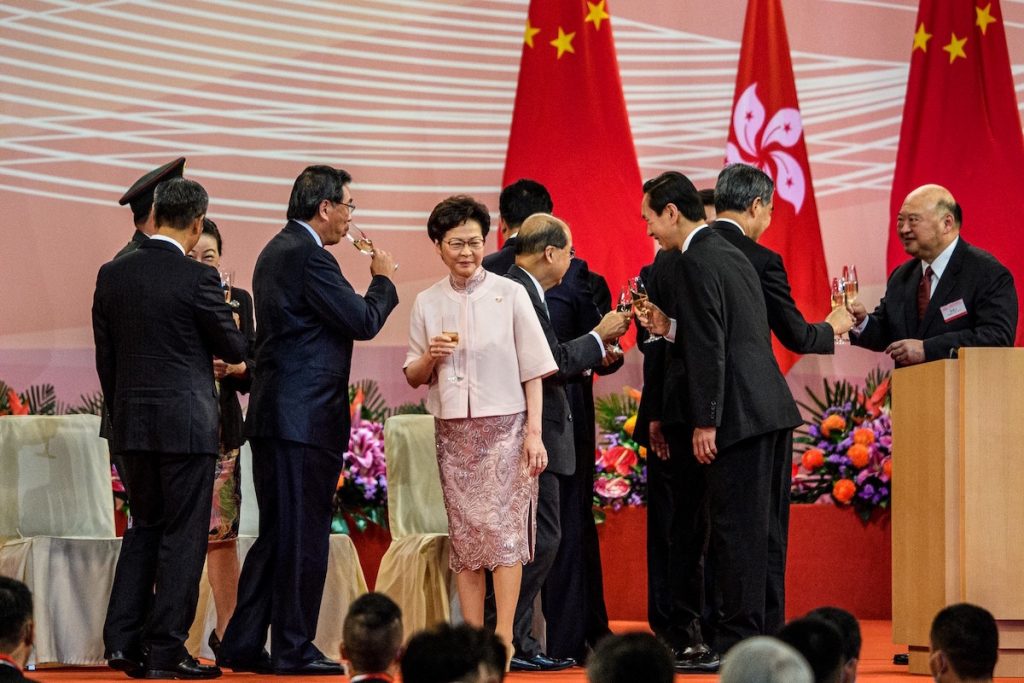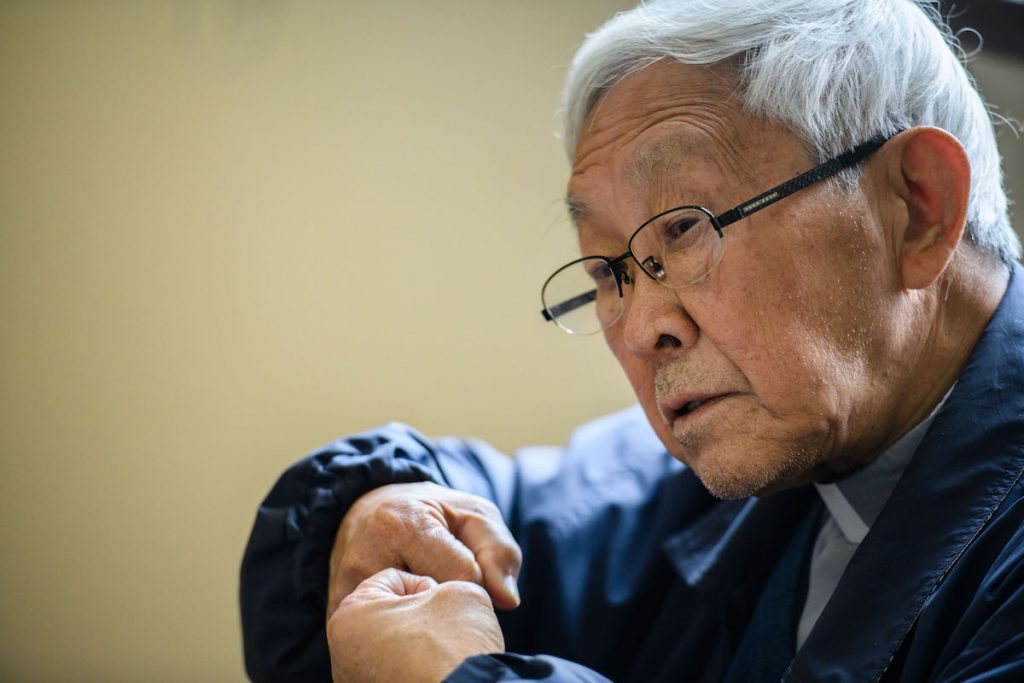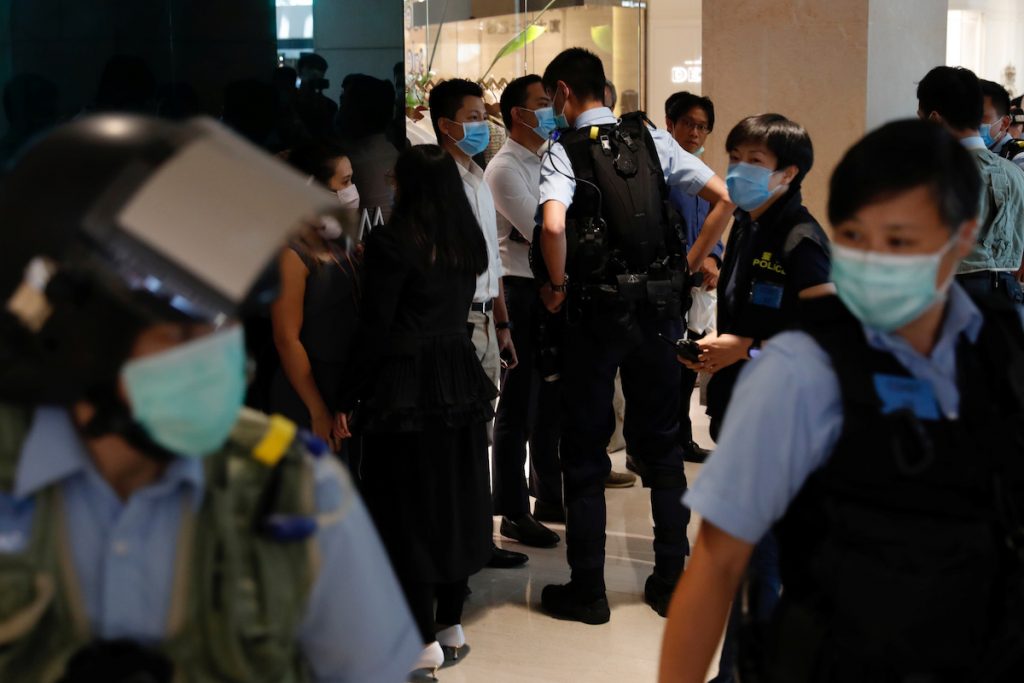Beijing has unveiled new national security laws for Hong Kong that will punish crimes labeled as secession, subversion, terrorism and collusion with foreign forces with up to life in prison, heralding a more authoritarian era for China’s freest city.
As the law came into force, authorities were set to throw a security blanket across the heart of the city’s financial center on July 1 after activists vowed to defy a police ban and rally against the measures.
China’s parliament passed the detailed legislation earlier on June 30, giving Beijing sweeping powers and setting the stage for radical changes to the global financial hub’s way of life.
In their most severe form, crimes will be punishable with life in prison. Punishments otherwise largely go up to 10 years. Properties related to crimes could be frozen or confiscated.
The security legislation will supersede existing Hong Kong laws where there is a conflict and mainland Chinese authorities could exercise jurisdiction over some major cases.
Interpretation powers belong to the Chinese parliament’s top decision-making body.
Judges for security cases will be appointed by the city’s chief executive.
According to the law, a new national security agency will be set up for the first time in Hong Kong and will not be under the jurisdiction of the local government. Authorities can carry out surveillance and wire-tap people suspected of endangering national security, it said.
Those asking foreign countries to sanction, blockade or take other hostile action against Hong Kong or China could be guilty of colluding with foreign forces.
Authorities shall take necessary measures to strengthen the management and servicing of foreign countries’ and international organizations’ branches in Hong Kong, as well as foreign media and NGOs in the city, the law says.

Amid fears the law will crush the city’s freedoms, prominent activist Joshua Wong’s Demosisto and other pro-democracy groups said they would dissolve.
“The punitive elements of the law are stupefying,” Simon Young, a law professor at the University of Hong Kong’s law school and a barrister, told Reuters.
“Let us hope no one tries to test this law, for the consequences to the individual and the legal system will be irreparable.”
Michael J. Abramowitz, president of Washington-based think tank Freedom House, said that Beijing “has unilaterally and brazenly superseded Hong Kong’s Basic Law.”
The new law has stripped millions of Hong Kongers of fundamental rights that are guaranteed to them under local and international law, Abramowitz said.
Shrouded in secrecy
Beijing had kept full details of the law shrouded in secrecy, giving Hong Kong’s 7.5 million people no time to digest the complex legislation before it entered into force at 11 p.m. on June 30.
Even Hong Kong’s Beijing-backed leader, Carrie Lam, said she was not privy to the draft despite her insisting most people had no reason to worry.
Cardinal John Tong Hon, apostolic administrator of Hong Kong, did similar last week in supporting the measures telling local paper Kung Kao Po that he “personally believes” the controversial laws “will have no effect on religious freedom,” noting that the region’s Basic Law guarantees “freedom of religion.”
Cardinal Joseph Zen, bishop emeritus of Hong Kong, said Cardinal Tong’s stance disappointed many in the Church, while acknowledging that his successor was in a “tricky” situation, reported CNA.
In a video posted June 30 on the Facebook page Catholics Concerned about the Hong Kong National Security Law Group, Cardinal Zen said that while Cardinal Tong may be confident the new law would not be used to bring the local Church under mainland control, he had “no confidence” that this would be the case.
Cardinal Zen likewise noted the lack of support, or even reaction from the Holy See on the recent developments both in Hong Kong and China’s mainland.

UK-based rights group Christian Solidarity Worldwide (CSW) said that members of Hong Kong’s Christian community have opposed the law as have local Falun Gong practitioners who have expressed fears that it will be the end of freedom of speech and freedom of belief in the city.
“The Chinese government is responsible for some of most serious human rights violations in the world today,” said CSW’s Chief Executive Mervyn Thomas.
CWS added that on the mainland China, religious leaders and lawyers who defend freedom of religion or belief have been charged under similar terms as in the new law such as ‘inciting to subvert state power, including Pastor Wang Yi of Early Rain Church.
The Christian rights group also said that ‘national security’ has long been used as a pretext for heavy restrictions on ethnic and religious minorities such as Uyghur Muslims and Tibetan Buddhists.
Collision course
The timing of the unveiling of the law was seen as a symbolic humiliation for Britain, coming just an hour before the 23rd anniversary of when Hong Kong’s last colonial governor, Chris Patten, a staunch critic of the law, tearfully handed back Hong Kong to Chinese rule.
The legislation pushes Beijing further along a collision course with the United States, Britain and other Western governments, which have said it erodes the high degree of autonomy the city was granted at its July 1, 1997, handover.
Britain and some two dozen Western countries urged China to reconsider the law, saying Beijing must preserve the right to assembly and free press.
“The United States will not stand idly by while China swallows Hong Kong into its authoritarian maw,” U.S. Secretary of State Mike Pompeo said in a statement.

He said the United States would stand with the people of Hong Kong and “respond to Beijing’s attacks on freedoms of speech, the press, and assembly, as well as the rule of law.”
Washington, already in dispute with China over trade, the South China Sea and the coronavirus, began eliminating Hong Kong’s special status under U.S. law on June 29, halting defense exports and restricting technology access.
China, which has rejected criticism of the law by Britain, the European Union, Japan, Taiwan and others, said it would retaliate.
As the law was passed in Beijing, the Chinese People’s Liberation Army garrison in Hong Kong held a drill which included exercises to stop suspicious vessels and arrest fugitives, according to the Weibo social media account of state-run CCTV’s military channel.
With Reuters





